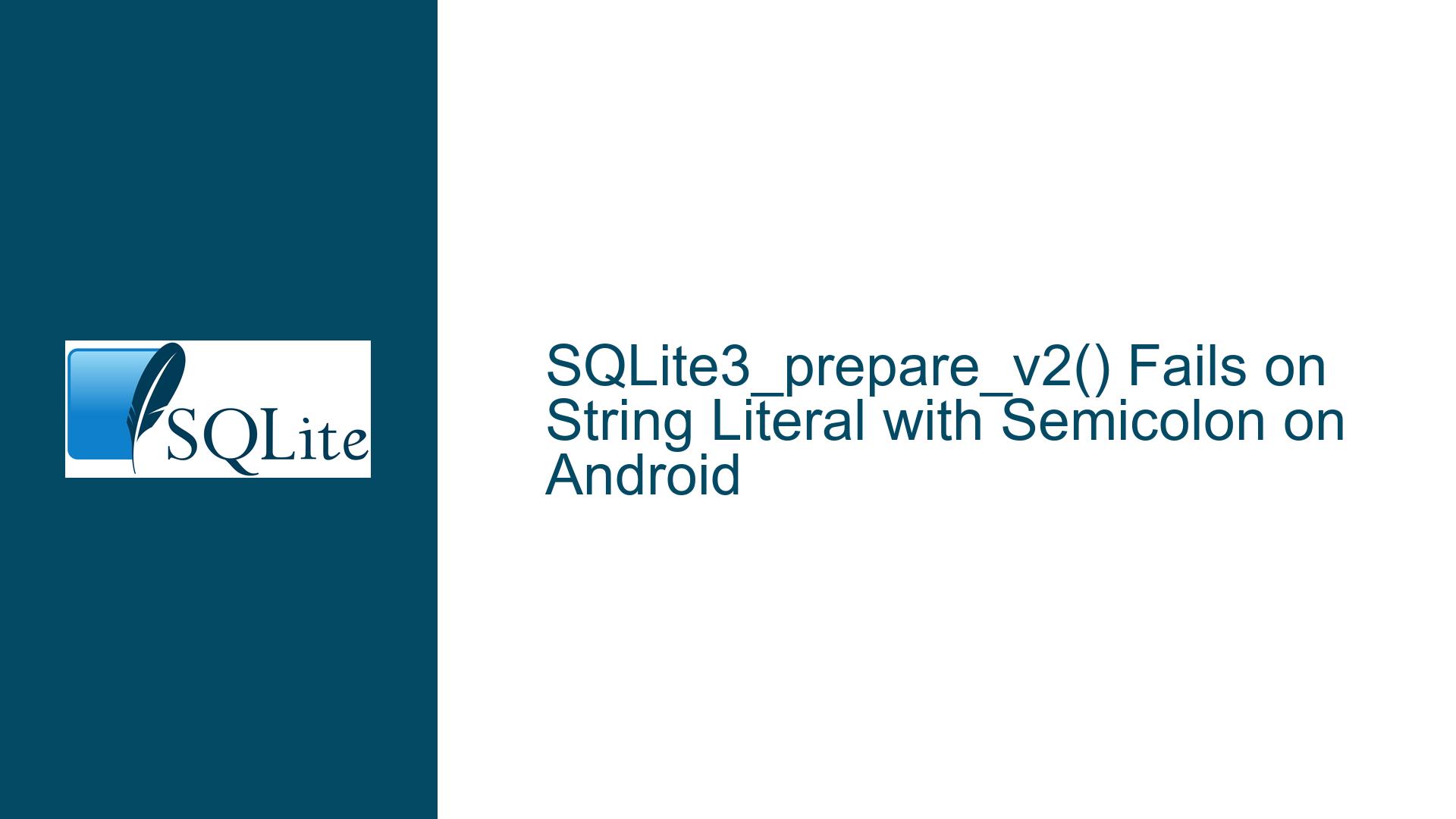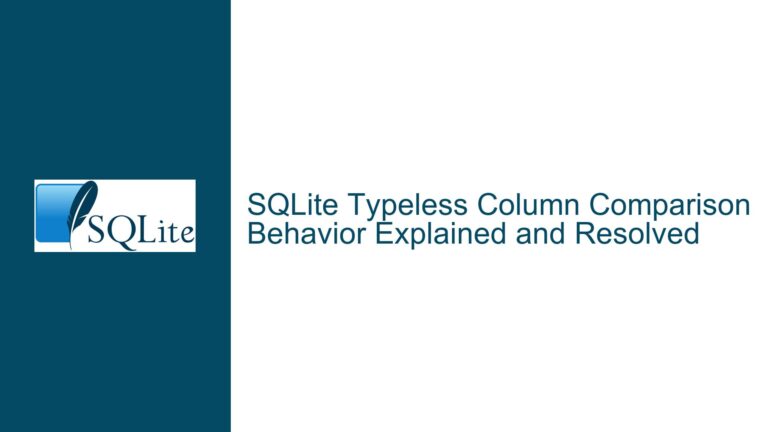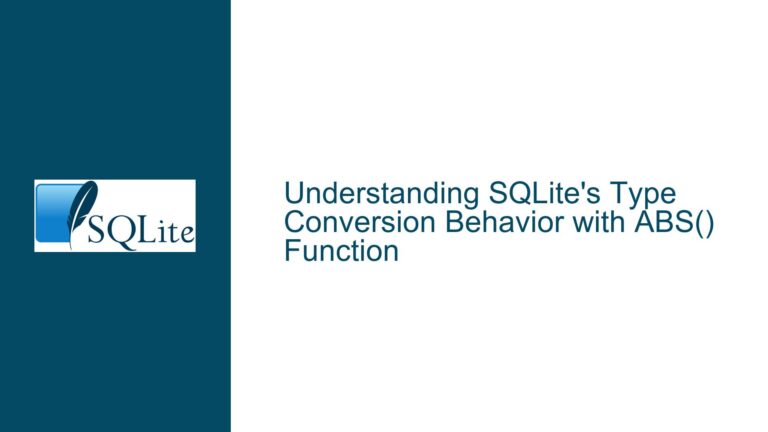SQLite3_prepare_v2() Fails on String Literal with Semicolon on Android
Issue Overview: SQLite3_prepare_v2() Fails with Semicolon in String Literal on Android
The core issue revolves around the sqlite3_prepare_v2() function in SQLite failing to properly parse SQL statements containing string literals with semicolons (;) when running on Android. Specifically, the function throws an "unrecognized token" error when encountering a semicolon within a string literal, such as 'a string with a ; in it'. This behavior is inconsistent across platforms, as the same SQL statements execute successfully on Ubuntu 16.04 and Windows 10. The problem manifests in a C++ application compiled using the Android NDK, utilizing the SQLite 3.39.0 amalgamation.
The error message indicates that the SQL parser is prematurely terminating at the semicolon within the string literal, treating it as a statement delimiter rather than part of the string. This suggests that the SQL statement is being altered or misinterpreted before reaching the sqlite3_prepare_v2() function. The issue is particularly problematic in scenarios involving database migrations, where SQL statements are read from text files and executed programmatically.
Possible Causes: Preprocessing or Platform-Specific Behavior
The root cause of this issue likely lies in one of the following areas:
Preprocessing of SQL Statements Before Execution: The error message suggests that the SQL statement is being split or truncated at the semicolon before being passed to
sqlite3_prepare_v2(). This could occur if the application or a library is performing preprocessing on the SQL string, such as splitting multiple statements or sanitizing input. On Android, the NDK or other platform-specific libraries might introduce behavior that alters the SQL string.Platform-Specific Handling of Escape Characters: The use of escape characters, such as
\;, might be handled differently on Android compared to other platforms. SQLite itself does not treat the backslash as an escape character in string literals, but the application or underlying libraries might interpret it differently on Android.Character Encoding or String Handling Differences: Android’s NDK might handle string encoding or memory management differently, leading to unexpected behavior when passing SQL strings to
sqlite3_prepare_v2(). For example, null-terminated strings or multibyte characters might be processed inconsistently.SQLite Configuration or Compilation Differences: The SQLite amalgamation might be compiled with different options or flags on Android, leading to subtle differences in behavior. For instance, certain compile-time options might affect how SQLite parses SQL statements.
Threading or Concurrency Issues: If the SQLite connection or the
sqlite3_prepare_v2()call is made in a multithreaded environment, race conditions or synchronization issues might cause the SQL string to be corrupted or misinterpreted.
Troubleshooting Steps, Solutions & Fixes: Resolving the Semicolon Parsing Issue
To address this issue, follow these detailed troubleshooting steps and solutions:
Step 1: Verify the SQL String Before Passing to sqlite3_prepare_v2()
Before passing the SQL string to sqlite3_prepare_v2(), log or inspect the string to ensure it has not been altered. Use platform-specific logging mechanisms (e.g., __android_log_print() on Android) to print the SQL string and verify its contents. This will help identify whether the issue lies in the application code or the SQLite library.
__android_log_print(ANDROID_LOG_DEBUG, "SQLiteDebug", "SQL Query: %s", query.c_str());
Step 2: Use Parameterized Queries to Avoid String Literal Issues
As suggested in the discussion, parameterized queries are a robust solution to avoid issues with special characters in string literals. Instead of embedding the string directly in the SQL statement, use placeholders (?) and bind the values separately.
const char* sql = "INSERT INTO tablename (aTextColumn) VALUES (?);";
sqlite3_stmt* stmt;
int rc = sqlite3_prepare_v2(connection, sql, -1, &stmt, NULL);
if (rc == SQLITE_OK) {
sqlite3_bind_text(stmt, 1, "a string with a ; in it", -1, SQLITE_STATIC);
rc = sqlite3_step(stmt);
if (rc == SQLITE_DONE) {
// Success
}
sqlite3_finalize(stmt);
}
Step 3: Check for Preprocessing or Sanitization Logic
Review the application code for any logic that processes or sanitizes SQL statements before passing them to sqlite3_prepare_v2(). Look for functions that split statements on semicolons or modify the SQL string in any way. If such logic exists, ensure it correctly handles string literals.
Step 4: Compare SQLite Compilation Flags Across Platforms
Ensure that the SQLite amalgamation is compiled with consistent flags across all platforms. Differences in compile-time options, such as SQLITE_OMIT_LOAD_EXTENSION or SQLITE_DQS, might affect parsing behavior. Compare the sqlite3.h header and compilation settings used on Android with those used on Ubuntu and Windows.
Step 5: Test with a Minimal Reproducible Example
Create a minimal reproducible example that isolates the issue. This example should include only the necessary code to reproduce the error, excluding any unrelated logic. Test this example on all platforms to confirm whether the issue is specific to Android.
const char* sql = "INSERT INTO tablename (aTextColumn) VALUES ('a string with a ; in it');";
sqlite3_stmt* stmt;
int rc = sqlite3_prepare_v2(connection, sql, -1, &stmt, NULL);
if (rc != SQLITE_OK) {
__android_log_print(ANDROID_LOG_ERROR, "SQLiteDebug", "Prepare failed: %s", sqlite3_errmsg(connection));
}
Step 6: Investigate Platform-Specific String Handling
Investigate how strings are handled in the Android NDK environment. Ensure that the SQL string is correctly null-terminated and that no additional processing is applied. Use tools like ndk-stack or addr2line to debug memory-related issues.
Step 7: Update SQLite to the Latest Version
If possible, update to the latest version of SQLite. Newer versions might include fixes or improvements related to SQL parsing or platform-specific behavior. Verify whether the issue persists with the updated version.
Step 8: Use sqlite3_exec for Non-Parameterized Queries
If parameterized queries are not feasible, consider using sqlite3_exec() for executing non-parameterized SQL statements. This function handles multiple statements and might bypass the issue with sqlite3_prepare_v2().
char* errMsg;
int rc = sqlite3_exec(connection, query.c_str(), NULL, NULL, &errMsg);
if (rc != SQLITE_OK) {
__android_log_print(ANDROID_LOG_ERROR, "SQLiteDebug", "Execution failed: %s", errMsg);
sqlite3_free(errMsg);
}
Step 9: Consult SQLite Documentation and Community Resources
Refer to the official SQLite documentation and community forums for additional insights. Other developers might have encountered similar issues and shared solutions or workarounds.
By following these steps, you should be able to identify and resolve the issue with sqlite3_prepare_v2() failing on string literals containing semicolons on Android. The key is to isolate the problem, verify the SQL string, and use parameterized queries or alternative execution methods where appropriate.






